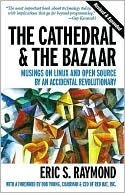More on this book
Community
Kindle Notes & Highlights
Sociologists years ago discovered that the averaged opinion of a mass of equally expert (or equally ignorant) observers is quite a bit more reliable a predictor than the opinion of a single randomly-chosen one of the observers. They called this the Delphi effect.
Nowadays it’s more important for a language to be convenient for humans than to be cheap for the computer.
I don’t think it’s a coincidence that the gestation period of Linux coincided with the birth of the World Wide Web, and that Linux left its infancy during the same period in 1993-1994 that saw the takeoff of the ISP industry and the explosion of mainstream interest in the Internet.
The Linux world behaves in many respects like a free market or an ecology, a collection of selfish agents attempting to maximize utility which in the process produces a self-correcting spontaneous order more elaborate and efficient than any amount of central planning could have achieved. Here, then, is the place to seek the “principle of understanding”.
if you want the most efficient production, you must give up trying to make programmers produce. Handle their subsistence, give them their heads, and forget about deadlines. To a conventional manager this sounds crazily indulgent and doomed — but it is exactly the recipe with which the open-source culture is now clobbering its competition.
Similarly, to be a hacker you have to get a basic thrill from solving problems, sharpening your skills, and exercising your intelligence.
When programmers are held both to an immutable feature list and a fixed drop-dead date, quality goes out the window and there is likely a colossal mess in the making. I am indebted to Marco Iansiti and Alan MacCormack of the Harvard Business School for showing me me evidence that relaxing either one of these constraints can make scheduling workable.


